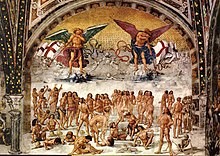First Epistle to the Corinthians
Part of the reason for suspecting that this passage is an interpolation is that in several manuscripts in the Western tradition, it is placed at the end of chapter 14 instead of at its canonical location.This kind of variability is generally considered by textual critics to be a sign that a note, initially placed in the margins of the document, has been copied into the body of the text by a scribe.The absence of an asterisk or obelisk in the margin of any manuscript – a common way of indicating doubt of authenticity – they argue, a strong argument that Paul wrote the passage and intended it in its traditional place.[11] Furthermore, some scholars believe that the passage 1 Corinthians 10:1–22[12] constitutes a separate letter fragment or scribal interpolation because it equates the consumption of meat sacrificed to idols with idolatry, while Paul seems to be more lenient on this issue in 8:1–13[13] and 10:23–11:1.[19] It also appears that, based on a letter the Corinthians sent Paul,[20] the congregation was requesting clarification on a number of matters, such as marriage and the consumption of meat previously offered to idols.[22][23] Anthony C. Thiselton suggests that it is possible that 1 Corinthians was written during Paul's first (brief) stay in Ephesus, at the end of his second journey, usually dated to early AD 54.The oldest manuscripts containing some or all of the text of this book include: The epistle may be divided into seven parts:[30] Now concerning the contribution for the saints: as I directed the churches of Galatia [...] Let all your things be done with charity.Amen.Some time before 2 Corinthians was written, Paul paid the church at Corinth a second visit[33] to check some rising disorder,[34] and wrote them a letter, now lost.[40] Paul then wrote this letter to the Corinthians, urging uniformity of belief ("that ye all speak the same thing and that there be no divisions among you", 1:10) and expounding Christian doctrine.Paul wants to bring them back to what he sees as correct doctrine, stating that God has given him the opportunity to be a "skilled master builder" to lay the foundation and let others build upon it.[42] 1 Corinthians 6:9-10 contains a notable condemnation of idolatry, thievery, drunkenness, slandering, swindling, adultery, and other acts the authors consider sexually immoral.The majority of early manuscripts end chapter 6 with the words δοξάσατε δὴ τὸν Θεὸν ἐν τῷ σώματι ὑμῶν, doxasate de ton theon en tō sōmati humōn, 'therefore glorify God in your body'.The epistle may include marriage as an apostolic practice in 1 Corinthians 9:5, "Do we not have the right to be accompanied by a believing wife, as do the other apostles and the brothers of the Lord and Cephas (Peter)?"The Greek word ἐσόπτρου, esoptrou (genitive; nominative: ἔσοπτρον, esoptron), here translated "glass", is ambiguous, possibly referring to a mirror or a lens.[53] Example English language translations include: Paul's usage is in keeping with rabbinic use of the term אספקלריה, aspaklaria, a borrowing from the Latin specularia.Their silence was unique to the particular situation in the Corinthian gatherings at that time, and on this reading, Paul did not intend his words to be universalized for all women of all churches of all eras.[65] Other scholars including Joseph Fitzmyer suggest that in verses 34–35, Paul may be quoting the position of some native Corinthian Christians regarding women who have been speaking out in cultic assemblies in order that he can then argue against it."[73] The last-known living connection to the apostles, Irenaeus, penned verse 10 using the word "veil" (κάλυμμα, kalumma) instead of "authority" (ἐξουσία, exousia) in Against Heresies, as did other Church Fathers in their writings, including Hippolytus, Origen, Chrysostom, Jerome, Epiphanius, Augustine, and Bede.Scholars point to 1 Cor 6:12:[87] 'Everything is lawful for me,' but I will not let myself be dominated by anything...whoever is joined to the Lord becomes one spirit with him.Based on interpretations of the text, it appears that Corinthians did not believe that the soul would return to its physical prison after death.Multiple academic theories have been proposed for the source of this language including Greek philosophical influence, Gnosticism and the teachings of Philo of Alexandria."[104] In dissent from the majority view, Robert M. Price,[105] Hermann Detering,[106] John V. M. Sturdy,[107] and David Oliver Smith[108] have each argued that 1 Corinthians 15:3–7 is a later interpolation.





Corinthian (disambiguation)New TestamentNew Testament papyriGospelsFour EvangelistsMatthewLukan ActsActs of the ApostlesEpistlesApocalypsePauline epistlesRomans2 CorinthiansGalatiansEphesiansPhilippiansColossians1 Thessalonians2 Thessalonians1 Timothy2 TimothyPhilemonHebrewsCatholic epistles1 Peter2 Peter1 John2 John3 JohnBook of RevelationAuthorshipLuke-ActsJohannine worksPetrine epistlesNew Testament canonNew Testament manuscriptsSynoptic GospelsJohannine literaturePastoral epistlesPauline literatureApocalypse of PaulCoptic Apocalypse of PaulActs of PaulPaul and TheclaPeter and PaulPrayer of PaulPaul the ApostleApostles in the New TestamentPauline ChristianityAncient GreekChristian BibleepistleSosthenesCorinthamanuensisKoine GreekAuthorship of the Pauline epistlesMarcion of SinopeinterpolatedVorlageEphesusCaesareaAntiochSecond Epistle to the CorinthiansThird Epistle to the Corinthianstext of surviving manuscripts variesPapyrus 46Codex VaticanusCodex SinaiticusPapyrus 123Codex AlexandrinusCodex Ephraemi RescriptusCodex FreerianusCodex ClaromontanusCodex CoislinianusPapyrus 14Papyrus 11Codex AmiatinusMinuscule 223HellenisticResolving personal disputesSexual purityMarriageChristian libertyWorshipDoctrine of Resurrection (15:1–58)paraenesisJesus ChristAnathemaMaranathaMennoniteShipshewana, Indianain the twinkling of an eyeBeatus de FacundusJewish ChristiansJerusalemApollosStephanasChristianTextus ReceptusNew King James VersionCambridge Bible for Schools and Collegesapostlesbrothers of the LordCephasTertullianJeromeAugustineimitators of JesusGeneva Biblethe titles of many worksgenitivenominativemirrorStrong's ConcordanceNew International VersionGood News BibleAdam ClarkeJudah ben IlaiBabylonian TalmudPaul's view of the role of women the churchspeaking tonguesFirst Epistle to Timothyprobably not written by PaulJoseph FitzmyerChristian headcovering